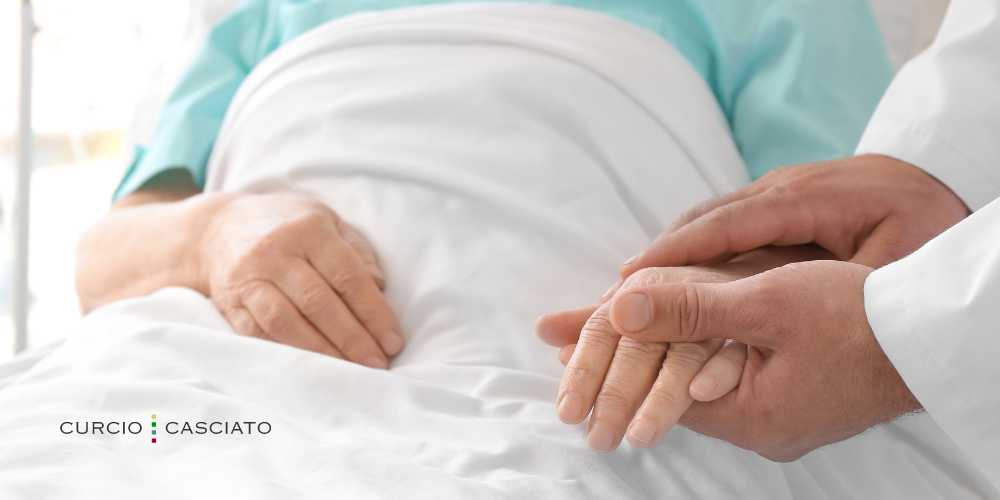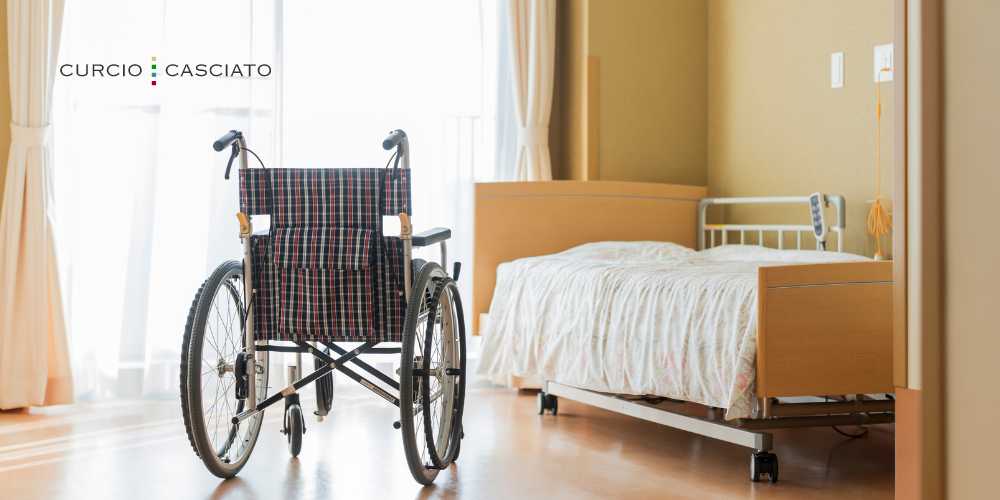What’s the difference between bacteremia and sepsis? Bacteremia and sepsis are related yet distinct conditions. Bacteremia refers to the presence of bacteria in the bloodstream, which can occur from activities like brushing teeth or during certain medical procedures. Bacteremia might not always cause symptoms or need to be treated. Sepsis, on the other hand, is a potentially fatal response to an infection, which often starts from bacteremia. When bacteria infections trigger this response, widespread inflammation, leading to tissue damage, organ failure, and potentially death, can occur. Prompt treatment is crucial in treating sepsis to prevent severe bloodstream infection complications.
Nursing home residents, unlike healthy people, are vulnerable to severe health issues like bacteremia and sepsis. So, healthcare professionals should do everything they can to decrease a patient’s risk of serious infection. Unfortunately, conditions like bacteremia and sepsis are common in Chicago nursing home settings and, if not properly treated or monitored, can be life-threatening.
If your loved one has suffered from sepsis as a result of a negligent healthcare provider, contact a Chicago nursing home infections attorney at Curcio & Casciato today. We’re prepared to help you pursue justice and hold the negligent healthcare provider or nursing home facility accountable for their lack of care.
Call (312) 321-1111 to schedule a free consultation with a Chicago nursing home abuse attorney on our team regarding your case.
What is Bacteremia?
Bacteremia, also known as blood poisoning or bloodstream infection (BSI), refers to the presence of bacteria in a person’s bloodstream. This often occurs when someone has existing infection, which enters their bloodstream and spreads throughout the body.
Bacteremia can be caused by various types of bacteria, including Escherichia coli (E. coli), Bacillus cereus (B. cereus), Streptococcus pneumoniae (pneumococcus), and more. Bacteremia itself is a serious infection, but it can lead to a more serious immune response like septic shock.
What is MRSA Bacteremia?
MRSA bacteremia refers to bacteremia caused by methicillin-resistant Staphylococcus aureus (MRSA) bacteria. MRSA is a strain of bacteria that has developed resistance to most broad-spectrum antibiotics, making it more challenging to treat than other infections.
MRSA in Chicago nursing homes is unacceptable, which is why we at Curcio & Casciato help represent individuals whose family members have suffered from MRSA bacteremia and other infections.
What is Sepsis?
Sepsis is a form of systemic inflammatory response syndrome (SIRS) that occurs as a result of an infection. Bacterial infections, viral infections, or fungal infections can trigger the immune system to have a dangerous reaction, which can trigger inflammation and widespread tissue damage throughout the body. This can lead to multiple organ dysfunction syndrome (MODS), organ failure, and even death.
Sepsis can occur as a result of a variety of infections, but once it’s begun, it requires prompt and aggressive medical treatment.
Sepsis vs Septic Shock
There are three stages of sepsis: sepsis, severe sepsis, and septic shock, with septic shock being the most severe of the three stages. Septic shock occurs when the patient’s immune response to the infection begins to cause organ damage, usually as a result of extremely low blood pressure.
According to one study, patients with severe sepsis or septic shock had a hospital mortality rate of over 40% (Intensive Care Med., 2018).
What is Septicemia?
Septicemia is another similar condition that has to do with bacterial infections which spread to the bloodstream. More specifically, this refers to the presence of multiplying bacteria in a person’s bloodstream. Because the bacteria is multiplying, it’s more difficult for the body to fight off the infection, increasing the risk of sepsis.
What is the Difference Between Bacteremia and Sepsis?
Bacteremia and sepsis are similar terms, but they refer to different conditions. Bacteremia refers to the presence of bacteria in the bloodstream, which can lead to sepsis. Sepsis, on the other hand, is a systemic inflammatory response syndrome triggered by an infection. Bacteremia can lead to sepsis, which is much more severe than bacteremia.
Additionally, sepsis can be caused by bacterial infections, viral infections, or fungal infections, whereas bacteremia can only be caused by bacteria in the blood. While the two terms are similar, it’s important to know the distinctions between the two, especially when it comes to understanding the severity of these conditions and potential patient outcomes for each condition.
What is the Difference Between Bacteremia and Septicemia?
Septicemia is a term that is often used interchangeably with bacteremia, but both refer to separate conditions. Bacteremia refers to bacteria in the blood, whereas septicemia specifically refers to the multiplication of bacteria in the blood.
Bacteremia is much less severe and often does not present with any symptoms. Septicemia, on the other hand, can result in systemic symptoms such as fever, chills, rapid heartbeat, and rapid breathing, often indicating widespread bacterial infections. Due to the severity of the infection, septicemia is also more likely to lead to sepsis.

What Causes Bacterial Infections?
Bacterial infections are caused by harmful bacteria entering the body and multiplying. Bacteria can enter through various means, such as through breaks in the skin, inhalation, ingestion of contaminated food or water, or sexual contact. Viable bacteria can also enter the body during various medical procedures, including dental procedures, especially if the healthcare provider fails to use sterile techniques to prevent bacteremia.
Medical devices like catheters or ventilators, as well as negligent medical practices, can also increase the risk of bacterial infections in nursing homes like UTIs, pneumonia, staph, flu, and septic shock. If your loved one has suffered from a Chicago nursing home UTI, especially with UTI and dementia, or another infection, contact the nursing home negligence attorneys at Curcio & Casciato for a free consultation.
Risk Factors for Bloodstream Infections
Several risk factors increase the likelihood of developing bloodstream infections, also known as bacteremia or sepsis. These include:
- Weak immune system
- Age
- Hospitalization
- Chronic illness
- Immunocompromising medications
- Invasive surgical treatment
- Invasive medical devices
- Intravenous drug use
- Poor wound care
- Malnutrition
When Does a Bloodstream Infection Become Deadly?
A bloodstream infection can become deadly when it progresses to severe sepsis or septic shock. In these advanced stages, the body’s immune response to the infection becomes dysregulated, which can lead to widespread inflammation, organ dysfunction, and dangerously low blood pressure.
Without timely and aggressive medical intervention, the infection can rapidly become life-threatening. Early detection is crucial for prevention. If you or a loved one suffered severe sepsis and you believe medical negligence played a role, contact a skilled Chicago sepsis lawyer from Curcio & Casciato to learn about your legal options.
Bacteremia in Chicago Nursing Home Patients
In Chicago nursing homes, patients often suffer from bacteremia, which may or may not progress into septic shock. This is often the result of nursing home abuse and neglect, which can include things like poor infection control or prevention practices, inadequate hygiene measures, improper wound care, and more.
While bacteremia itself may not be deadly, it can very easily progress into sepsis, especially in elderly patients. Rigorous oversight, staff training, and adherence to infection control protocols can help prevent bacteremia and other infections, ensuring the well-being of nursing home residents in Chicago and beyond.
Can You Sue a Nursing Home for Sepsis in Illinois?
Yes, you can sue a nursing home for sepsis in Illinois if there is evidence that negligence directly contributed to the resident’s sepsis. If a nursing home fails to meet the medical standards of care and their negligence leads to a resident developing sepsis, the affected individual or their family may have grounds for a lawsuit to seek compensation for damages.
If your loved one has suffered from a serious illness as a result of nursing home negligence, the Chicago nursing home sepsis attorneys at Curcio & Casciato are here to help.
How Negligence Leads to Bloodstream Infections in Chicago
Negligence in healthcare settings can contribute to bloodstream infections in several ways, including:
- Poor infection prevention practices
- Neglecting to promptly address infections
- Failure to monitor residents for signs of infection or changes in health status
- Improper insertion, maintenance, or removal of indwelling medical devices like catheters
- Chicago nursing home understaffing
- Inadequate hydration and malnutrition in Chicago nursing homes

Chicago Nursing Home Wrongful Death
Due to the high mortality rate associated with sepsis, many elderly individuals never recover from the condition. If you have lost your loved one to sepsis as a result of negligence in an assisted living facility, contact a Chicago nursing home wrongful death lawyer at Curcio & Casciato as soon as possible.
How to Investigate Your Loved One’s Death Certificate
If you’re not sure about the cause of your loved one’s death, or you’re suspicious about the circumstances surrounding their death, you can investigate their death certificate. You can do this by obtaining a copy of the certificate and reviewing the document for accuracy and completeness.
Pay attention to the listed cause(s) of death, contributing factors, and any discrepancies. If you have concerns about the accuracy or circumstances surrounding the death, consider consulting with a qualified medical professional or attorney specializing in wrongful death cases.
When Should You Contact a Chicago Nursing Home Abuse Lawyer?
You should contact a Chicago nursing home abuse lawyer as soon as you suspect that your loved one has experienced abuse or neglect in a nursing home. Whether you’ve noticed signs of physical abuse, emotional distress, neglect, or financial exploitation, a nursing home abuse lawyer can provide valuable guidance and support.
Chicago Nursing Home Sepsis Attorneys
Nursing homes have a legal duty to provide residents with a reasonable standard of care, including monitoring for signs of infection, promptly treating infections, maintaining cleanliness and hygiene standards, and ensuring appropriate staffing levels.
If you suspect that your loved one has suffered from sepsis due to nursing home negligence in Chicago, the nursing home sepsis attorneys at Curcio & Casciato are here to advocate on your behalf. If if they suffered in a hospital setting, contact our Chicago hospital negligence lawyer group. Call (312) 321-1111 or contact us via our website to schedule a free initial consultation regarding your case.



